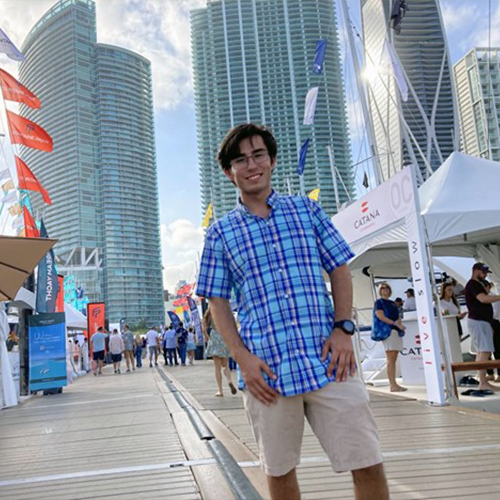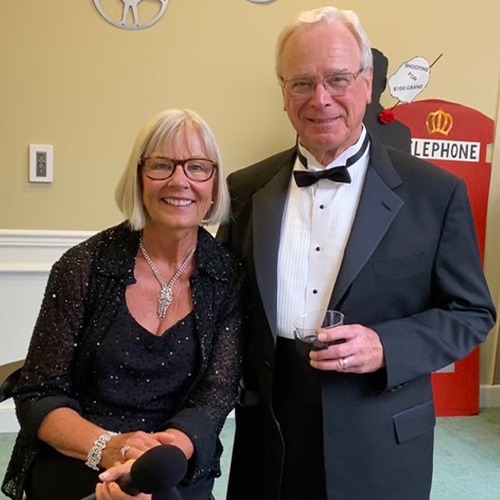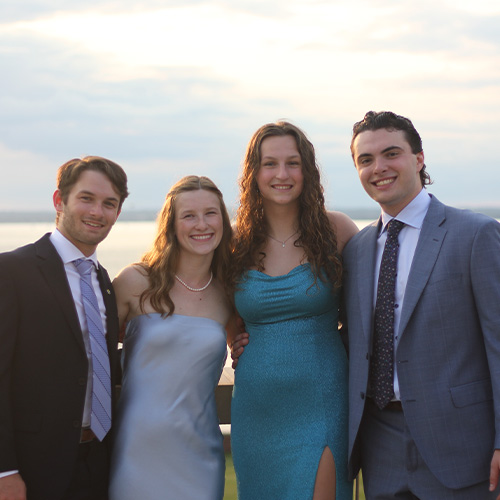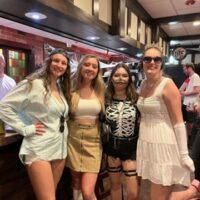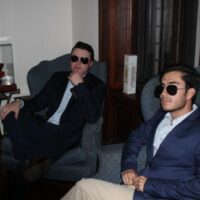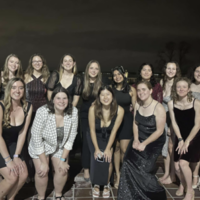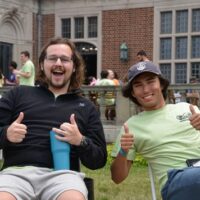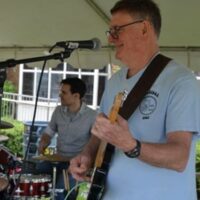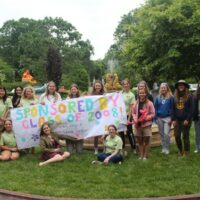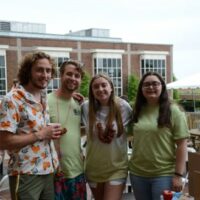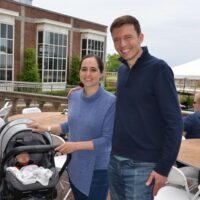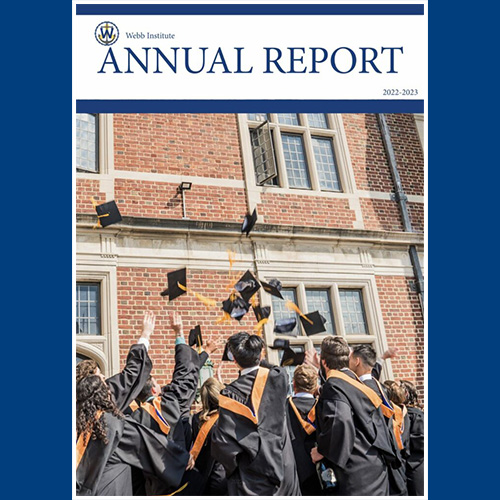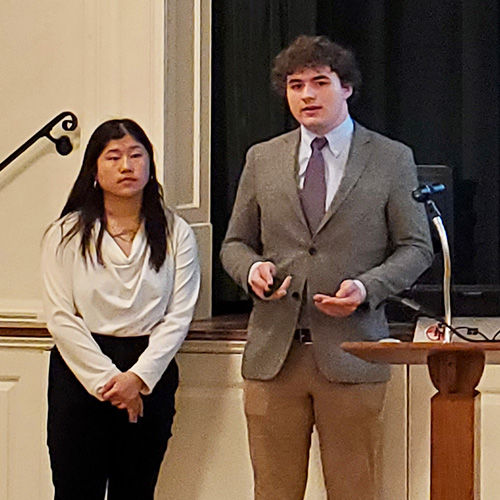New Student Journey: First Year at Webb
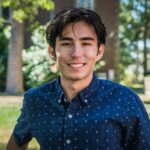 by Hank Wolfe ’26
by Hank Wolfe ’26
Over the last year, I have received the honor of becoming a Webbie and learning what the title holds. It’s more than a nickname or label, being a Webbie is a way of life – one that includes the excessive wearing of flip-flops and late night burrito orders. Jokes aside, becoming a Webbie has shined a light for me on the power of community. I came into Webb excited and ready to work but with some hesitation-hesitation about figuring out how I would fit into the Webb family I had heard so much about. The idea of living with a hundred peers seemed daunting. My nerves would settle as I joined my new home.
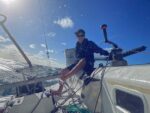
What a great first year it was! My classmates and I meshed from the start. Laughter became a norm in the design studio. Even on the nights when the homework seemed endless, the optimism and humor of my friends got me through. Learning to have fun and acknowledging the work will inevitably get done is the key to success at Webb. Having fun consists of different things for different people. Sailing is a huge part of it for me. Thanks to the opportunities the Webb sailing team and NEKA have provided, I traveled the east coast to sail, going as far as Key West with Zach Doerr ‘24 for a weekend during our Winter Work term.
The Webb family extends far beyond the classroom. I had the privilege of working at Michael Rybovich and Sons Custom Boatworks under Dusty Rybovich ‘10, the talented foreman, “Flipper,” and the rest of the crew. They eagerly took me under their wing, teaching me all there is to know about constructing sportfishing yachts. The hands-on experience I gained at the shipyard will last me a lifetime. While working in Florida, numerous other Webbies invited me to join them for dinner, and even stay with them for a weekend. The endless generosity from the Webb network was a constant reminder of how lucky I am to be a part of this community.
Going into sophomore year I am looking forward to meeting the next round of freshmen. I hope to lead by example, showing them the responsibilities of being a Webbie. I am excited to dive further into the NAME world, make more memories, and share laughs – all from the comfort of a pair of flip-flops.
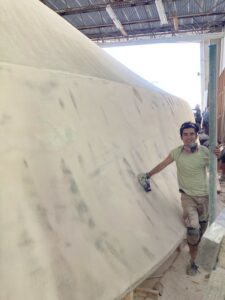

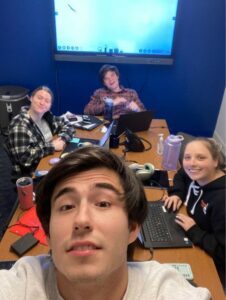
Heritage Society Spotlight
by: Dr. Roger H. Compton ’61, PG ’64
Dean Emeritus, Webb Institute
I was introduced to Webb Institute of Naval Architecture quite by accident when I visited our high school guidance counsellor, Mr. Chiles, who was consoling me for not being the primary appointment in my class to attend the U.S. Naval Academy. He handed me a folded piece of paper with an anchor logo on it and said, “you’re interested in boats – you might be interested in this.” Thus began my life-long involvement with Webb.
After an interview with Admiral Haeberle, I was surprised – but delighted – to be offered a position in the Class of 1961 with 20 other young men from all over the U.S. Over the next four years, we bonded as a class, drank beer and ate pizza at Stango’s, struggled through Benny’s math courses and Doc Joe’s chemistry, metallurgy, and thermodynamics courses, and had many tales to tell about our Winter Work experiences. I enjoy telling my friends, who know nothing about Webb’s class size, that I graduated fifth in my class in both high school and college (without explaining that we had almost 600 in my high school class, but only 10 in the Webb Class of 1961)!
My first full-time job after graduation was at Electric Boat (EB) in Groton, CT, during the early days of the U.S. Navy’s Fleet Ballistic Missile (FBM) program. Exciting stuff! After working for a year in the Naval Architecture Department, I applied for a position in the EB Research Department. I was told that I needed more formal education. As it turned out, that was coincident with Webb offering a civilian master’s degree while working part-time in the newly formed Webb Research Department. George Kerr, Webb ’59, classmate Charlie Pieroth, and I were chosen to be in the first class. I was fortunate to have been able to take a couple of courses at Stevens Institute with Dan Savitsky and to be sent to IBM Headquarters in Manhattan to learn FORTRAN. That training allowed me to become the “computer guy” at Webb and to teach a few sessions of programming to Prof. Otto Karst’s junior math students. That experience, along with the superb mentoring of Bob Zubaly (Webb ’55), Norm Hamlin (Webb ‘44B), and Dean Tom Curran (Webb 1925) were instrumental in getting me to apply for a faculty position at the U.S. Naval Academy (USNA). During my 32-year tenure, my colleagues and I were able to establish an ABET-accredited major in naval architecture and build a world-class towing tank. Among the great young midshipmen that I had the pleasure to mentor, was Tom Kiss (USNA ’88), the son of Ron (Webb ’63) and June Kiss (Hon.).
While in Annapolis, I became involved in a very active community theater culture and, in 1981, was cast as Curly in Oklahoma! Guess who was Laurie? Jill and I have been together – and making music – ever since. Jill has made my life complete.
In August of 1998 I retired from USNA to accept the best job on the planet – to be the Dean of Webb Institute, while enjoying the shortest commute on Long Island. Although it was difficult to leave USNA and Annapolis, a dinner with Ron and June Kiss at which we discussed our mutual “adventure in Glen Cove,” sealed the deal for Jill and me. We thoroughly enjoyed our 13-year tenure during which we were able to introduce a small craft design experience with a formal presentation to an invited panel of professionals to juniors (SD 1), and to encourage Webbies – students and staff – to enjoy and participate in musical and theatrical activities. We were most proud of the success of the Webb Family Singers (aka the WooFS) and the two fully staged productions at our 2010 and 2011 Homecomings. After officially retiring in 2011 – the 50th anniversary of my Webb graduation – we were delighted to enjoy an encore year to teach a couple of naval architecture courses to the Classes of 2017 and 2019. From about 2005 until 2019, we enjoyed getting to know incoming freshman classes with the freehand drawing “coursette” offered the week before classes actually started.
In December 2016, we sold our boats and home on Maryland’s Eastern Shore and moved to a retirement community in Vero Beach, Florida. What we found was a town with many opportunities to sing, play water volleyball, and ride our bikes. Our two real boats have been replaced by three remote-controlled model sailboats – fun, but not quite the same as the real thing!
We are happy to be charter members of the Heritage Society when we named Webb the beneficiary of a life insurance policy and named Webb, along with my kids, Dawn, and Brian, to divide up the balance of our estate.
Without a doubt, I owe everything that I accomplished in my professional career to Webb Institute.
SOCO: A Year in Review
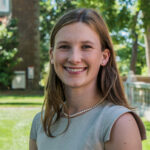
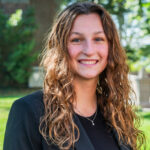 By Phoebe Garrett ’25 Annabel Bornebusch ’26
By Phoebe Garrett ’25 Annabel Bornebusch ’26

(Pictured Left to Right) Students Eliott Ocheltree ‘24, Ryan Krimper ‘26, Steven Katz ‘26, Max Mah ‘24, and Millay Metz ‘26 Performing Jazz Music at a Ruby Lounge Social
This year, students returned to campus in August of 2023 excited to begin a new school year! The first event of the year was a welcome back Community Social to celebrate faculty and students after the first week of classes was completed! Throughout the fall semester, the Social Committee continued to host Community Socials to bring together Webb students, faculty, and staff each month. The Yacht Club socials were especially fun for students and faculty to enjoy the warm weather, the beautiful yacht club and beach, and swimming and fishing in the Long Island Sound.
In October, the freshman class hosted their first Webb event: the annual Halloween party! The party took place in the Pub which was decorated with spooky decorations and had fun halloween-themed food, music, and activities! The costume contest was a highlight of the night where the students with the most creative costumes were recognized!
During the week of Halloween, the Social Committee also hosted a pumpkin carving contest where each class was able to carve a pumpkin for all Webb students to vote on a winner. The Junior Class pumpkin “Wear your PPE… or else” won and they had a pizza party celebration.
With Thanksgiving just around the corner, it was time for SoCo’s annual Casino Night. The senior class, led by class representatives, Victoria Kim and Erin Postma, planned a magical casino night full of poker, blackjack, roulette, horse racing, arm wrestling, and more! All Webb students were dressed up and had a wonderful night. One of the highlights was the silent auction where students used the Webb casino money they earned throughout the night to bet on the array of prizes displayed at the event.
Following Casino Night’s great success, SoCo had a holiday decorating social where all of Webb’s faculty and students came together to decorate the Visconti reception room with a beautiful winter village and a christmas tree! There was holiday music and many snacks as well.
The SoCo Christmas Party was the last big event of the year. Ugly Christmas sweaters were encouraged for the event and the Webb jazz band played holiday music for the students to dance and sing along. Each class had fun gifting each other with gifts and celebrating the end of the fall semester.
In the spring of 2023, the first event was the annual St. Patrick’s Day party hosted by the Junior class. Festivities included a potato bobbing and potato throwing.
For Pi Day, students participated in a school-wide pie baking competition for a SoCo sponsored froyo trip by baking a pie that was judged on its taste, difficulty, originality, and presentation. The winning submission this year was the beef and stout pie by Will Calli, Miguel Sanchez, and Emma Passariello.
At the beginning of May, students attended the annual Cinco De Mayo party hosted by the Sophomore class. Students packed into the Brocket Arms Pub for Cactus-Cafe catered appetizers, drinks, and dancing. Some sophomore students, including Tyler Zylinski, Luke Foye, and John Feleciano, took on the role of DJ for the fun evening. Events in the month of May also included numerous yacht club socials and a Founder’s Day Social.
To continue a fun spring semester, on June 3, we had Webb’s Annual Webbstock! This year the festivities were fully revived after the pandemic and over 100 guests were in attendance. Everyone got to enjoy eating hot dogs and hamburgers while listening to live music performed by faculty and students as well as a band called “Yesterday’s News” which included Webb alumni Joe Cole (class of 1992). Students were also able to enjoy singing some karaoke, and rotating through the various lawn games, especially a new Webbstock Cornhole Tournament. Many students enjoyed racing through the inflatables, which included a 65-foot obstacle course and a double water slide. The class of 2008 sponsored the event in loving memory of their classmate, Johanna Lee Exner. During her time at Webb, Johanna was very involved in the Webb Social Committee and worked extremely hard to plan events such as Webbstock. It was extremely fitting for Webb’s largest event of the year to be held in her memory. A big thanks to the class of 2008, and we think that Johanna would have been very proud!
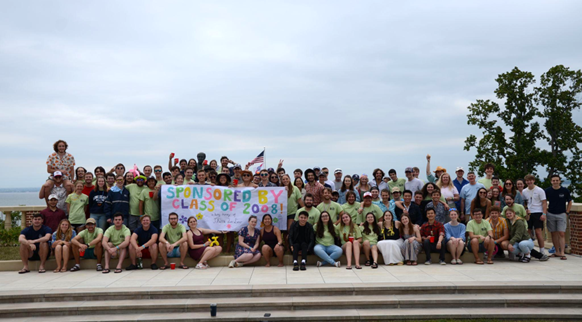
Group Photo of Webb Students, Faculty, and Guests at Webbstock 2023
On June 19, students dressed up in elegant evening attire to attend a fun-filled Great Gatsby-themed night. After a fancy dinner, students opened their bottles of champagne to a beautiful sunset. Students also played croquet and listened to music performed by a swing band, with a special feature by Max Mah ‘24.
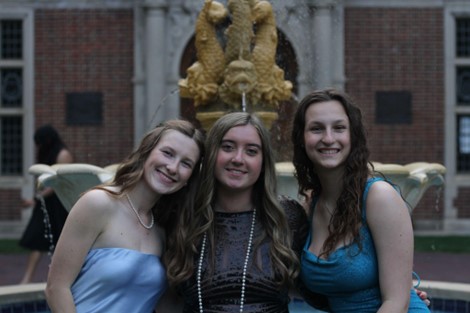
Kasey Kennedy ‘23, Phoebe Garrett ‘25, & Annabel Bornebush ‘26
Read the 2022-2023 Annual Report!
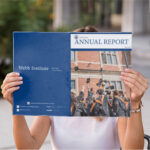 Webb Institute is proud to present our Annual Report for the 2022-23 giving year. This year’s report showcases the invaluable contributions of our alumni, parents, friends, and trustees, whose unwavering support continues to impact both Webb and its students.
Webb Institute is proud to present our Annual Report for the 2022-23 giving year. This year’s report showcases the invaluable contributions of our alumni, parents, friends, and trustees, whose unwavering support continues to impact both Webb and its students.
Your commitment is fundamental to our pursuit of academic excellence and the long-term viability of Webb. The dedication of our supporters is the cornerstone of Webb’s enduring success, and we thank you for continuing this journey with us in our commitment to excellence. Your partnership is not just valued; it is vital. As we look to the future, we are excited to continue this journey with you, building on our shared vision and commitment to excellence.
Click here to read the 2022-2023 Annual Report
Click here for the PDF. version
Senior Thesis: Development of a Method for Comparison of Shipboard Power Transmission Models
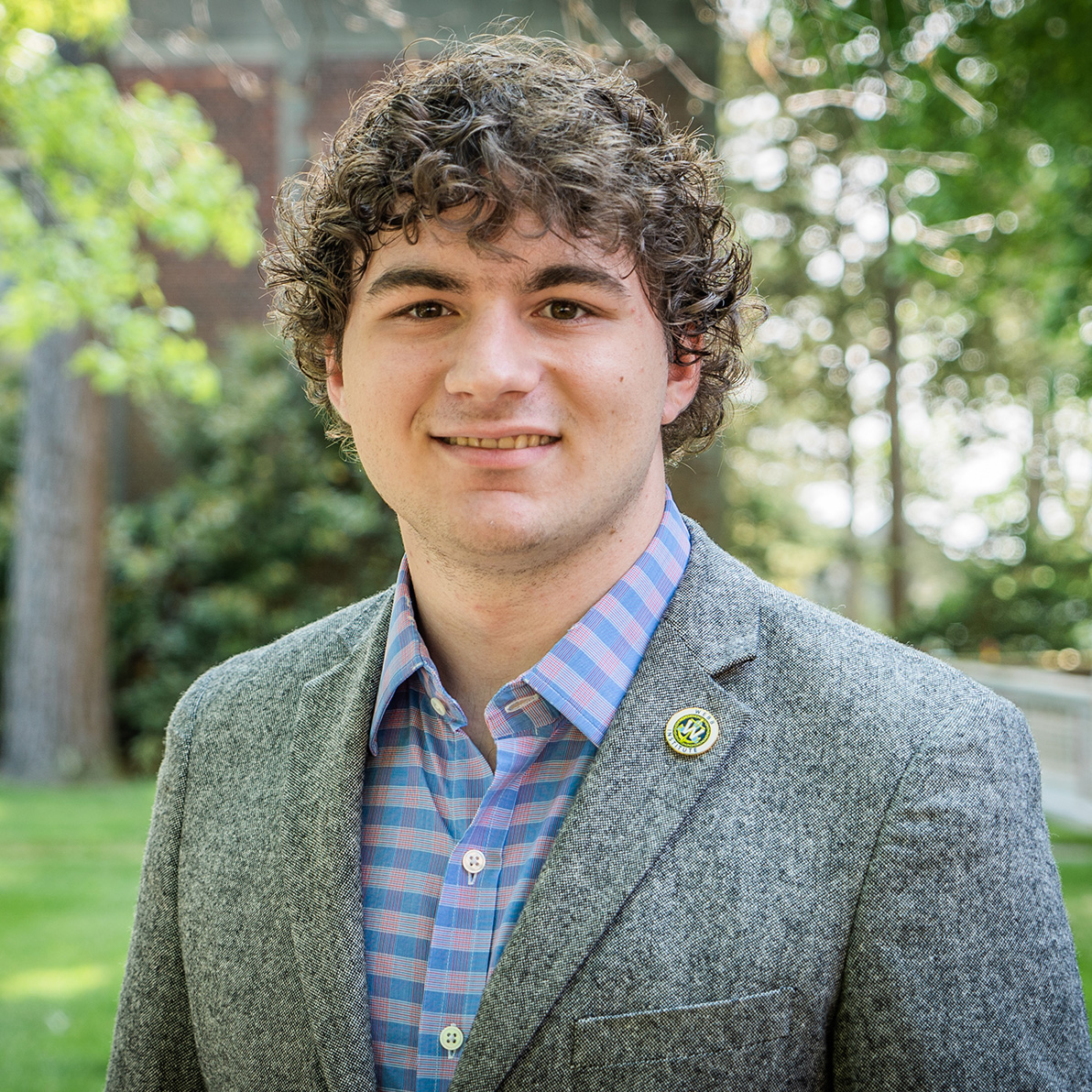
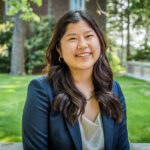 By Spencer Margosian ’23 and Tori Kim ’23
By Spencer Margosian ’23 and Tori Kim ’23
It is the beauty of research that in pursuit of solving even a seemingly simple problem, one will inevitably discover far more new problems to solve than they will answers to publish. Looking back on the past year, the best example of this was when our electrical engineering thesis was almost completely derailed for well over a month, by a problem fundamental to naval architecture. In this article, we would like to discuss how we came across this problem, how we solved it, and how this detour in our work taught us a fundamental principle of research. The minimum viable background for discussion of our thesis takes about four sentences. For large vessels, medium-voltage alternating current is usually used to transmit electrical power.
An emerging technology, medium-voltage direct current power transmission, is poised to be ready for commercial application approximately within the next decade. Because MVDC is a new technology, it is not well known to marine engineers and will likely be underutilized if it remains unknown.
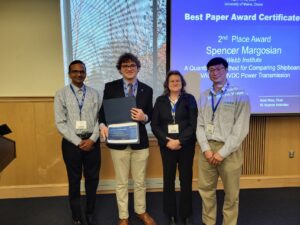
Spencer Margosian ’23 accepting his award during SNAME’s Student Paper night.
Our thesis sets out to identify in simple terms whether MVAC or MVDC is the better system model for a given application so that a marine engineer does not need to do so from first principles. The first time we attempted to compare the two
system models directly, we created two calculation methods which modeled steady-state operation of a given vessel. When we tested the two methods with a computer script, the answers they returned looked like they made sense when considered one-at-a-time. Upon examining the entire set of cases, however, we realized that not a single case actually implied that DC was preferable to AC—not even those which we were positive would be.
The discovery of this fault effectively stopped us in our tracks, not knowing what we had done wrong or how we might fix our program to account for such error. To solve this problem, we would have to embrace a core principle of research: that setting out to solve a problem in one field will often result in encountering new problems in unrelated ones. Following the failure of the original analysis, we would come to realize that using a steady-state analysis failed to account for the biggest advantage of MVDC systems, which is their high efficiency in loads which vary over time. This meant that to properly compare the two system models, it would be necessary to model them as dynamic systems and not constant signals.
“We are immensely grateful to Webb for preparing us not only with the education in marine engineering necessary to understand marine electrical engineering, but also for providing us the naval architecture background that we needed to solve our resistance problem. Despite neither of us identifying as naval architects at heart, the Webb education prepared us to tackle every problem our research threw at us.”
We had found a new problem to solve—how does a ship’s electrical load change throughout a voyage?—and despite our original research being one of theoretical electrical engineering, the answer to our new question relied almost exclusively on our understanding of naval architecture.
The biggest load experienced by a ship at sea is naturally the energy required to propel the vessel through the water. As a ship sails through waves, the resistance imparted on the vessel varies constantly, changing the propulsion power. This phenomenon, called added wave resistance, cannot be easily predicted using statistics—in fact, it is not analytically possible to do so. However, by algebraically manipulating a well-documented standardized wave spectrum, we were able to closely approximate what the added wave resistance spectrum would look like and solve our original problem of characterizing how resistance varies over a voyage.
Watch Spencer and Tori’s Thesis Presentation below:
Click here to view the Class of 2023 Thesis Page

